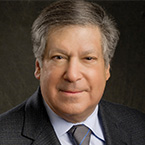
For demonstrating that the immune system plays an important role in tumor development by investigating tumor growth in adaptive immune system-deficient RAG2 knockout mice, and for developing and championing the concept of “cancer immunoediting,” proving that tumors may escape immune recognition via antigenicity loss.
A celebrated visionary and cancer research pioneer, Dr. Schreiber has uncovered groundbreaking research findings that have led to a better understanding of immune surveillance in cancer pathogenesis. As a cytokine biologist, he developed monoclonal antibodies to study receptor function that would ultimately shed light on tumor biology. Specifically, he discovered that interferon-gamma (IFNγ) is a cytokine that elicits macrophage anti-tumor responses and uncovered the structure and function of the IFNγ receptor. His landmark study investigating tumor growth in recombination activating gene RAG2 knockout mice, which lack an adaptive immune system, and signal transducer and activator of transcription STAT1 knockout mice, unequivocally demonstrated that the immune system plays a critical role in tumor development. Dr. Schreiber and his team demonstrated that indeed mice that lack an immune system develop more sarcomas and epithelial tumors when compared to wild type mice. He also demonstrated that IFNγ elicits a response by essentially making tumor cells visible to the immune system. In addition, transplanted tumors only continued growing in wild type mice when the tumor was originally from wild type but not immune-compromised mice pointing towards an immune system that selects for tumor cells more likely to escape undetected. He would later coin this counter-current concept as “cancer immunoediting”, where tumors can escape immune recognition by losing their antigenicity.
Dr. Schreiber has continued defining immunoediting mechanisms and potential novel tumor neoantigens to target by using genomic approaches. He is at the forefront of the immunogenomics field, identifying genetic sequences from tumor neoantigens that the immune system will likely recognize to develop T-cell mediated therapeutics. He is also leading efforts to develop personalized neoantigen based cancer vaccines. His work revived scientific interest in tumor immunology and has helped form the basis of modern immunotherapeutic approaches to cancer treatment.
Career Highlights
2017 Balzan Award, International Balzan Prize Foundation, Milan, Italy
2014 AACR-Cancer Research Institute Lloyd J. Old Award in Cancer Immunology, AACR
2013 Elected Member, American National Academy of Sciences
2010 Elected Fellow, American Academy of Arts and Sciences
2008 Carl and Gerty Cori Faculty Achievement Award, Washington University
2007 The Charles Rodolphe Brupbacher Prize for Cancer Research, Charles Rodolphe Brupbacher Foundation, Zurich, Switzerland
2001 William B. Coley Award for Distinguished Research in Basic and Tumor Immunology, Cancer Research Institute
1998 Marie T. Bonazinga Award for Excellence in Leukocyte Biology Research, Society of Leukocyte Biology
1996 Elected Fellow, American Association for the Advancement of Science
1996 Syemour & Vivian Milstein Award for Excellence in Interferon and Cytokine Research, International Cytokine and Interferon Society